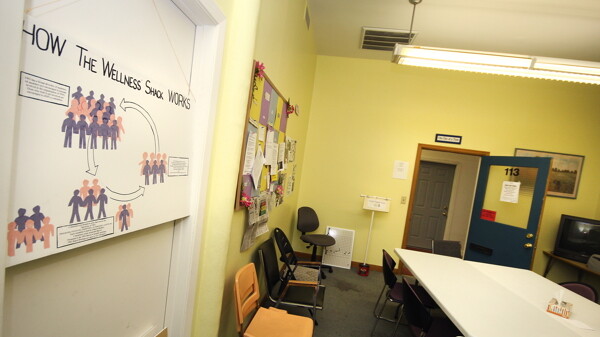Hope and Healing
Wellness Shack a safe space to tackle mental illness
Tom Giffey, photos by Andrea Paulseth |

For a problem that impacts about a quarter of American adults – and 1 in 17 of them seriously – mental illness is still a largely taboo subject. The Wellness Shack’s Mental Health Awareness Concert is aimed at changing that.
“It’s part of our attempt to make people more aware of mental health recovery, and to reduce stigma,” says Bob Schrader, a Wellness Shack volunteer and board member. Founded in 2004, the Wellness Shack is a nonprofit center offering peer support, education, and advocacy for those recovering from mental illness. The Oct. 11 event at the Eau Claire Hotel & Convention Center (formerly the Ramada Inn) is a free gathering that will feature a DJ, karaoke, music and poetry performed by Wellness Shack members, an art display, refreshments, and a bit of fundraising (items will be for sale). The event’s fellowship – everyone is invited, whether or not they have a connection to the Shack – is part of a deeper, shame-busting message: People with mental illness are human beings like everyone else.
The Wellness Shack itself is located in a home-like suite of rooms at 515 S. Barstow St. It offers space for those with mental illness to relax, meditate, commiserate, and create art. While it operates on a shoestring budget – just $32,000 annually, much of it from a single federal grant – the Shack helped more than 234 people in the first six months of 2013 alone.
The Wellness Shack is built around the concept of peer support. As Schrader explains, “Somebody who has been through the experience of mental illness – instability, crisis, medical treatment – better understands what someone is going through.” Working with peers who have shared similar experiences helps people learn about their own mental illnesses, what their symptoms are, and what factors in their lives – from stress to diet to sleep – can impact those symptoms. (Peer support is typically a complement to traditional mental health services.) The Wellness Shack hosts peer-run groups focused on anxiety and depression, dipolar disorder, and dual diagnosis (those with mental illness and substance abuse problems), as well as a general support group and a Procovery group, which focuses on proactive recovery.
Schrader has been involved with Wellness Shack for four years after learning about it through a college course, while others, like Jean Close, came at the advice of their medical providers. About three years ago, Close began attending general support group meetings. “I found a safe place here,” explains Close, now a board member and co-facilitator of the bipolar group.
Schrader once posed a question to the Wellness Shack board of directors – a question that sums up the facility’s purpose: “If the Wellness Shack were selling something, what would it be selling? Hope.”
Mental Health Awareness Concert presented by the Wellness Shack • Friday, Oct. 11 • 7-10pm • Eau Claire Hotel & Convention Center (formerly Ramada Inn), 205 S. Barstow • FREE • 855-7705 • wellnessshack.org.


















